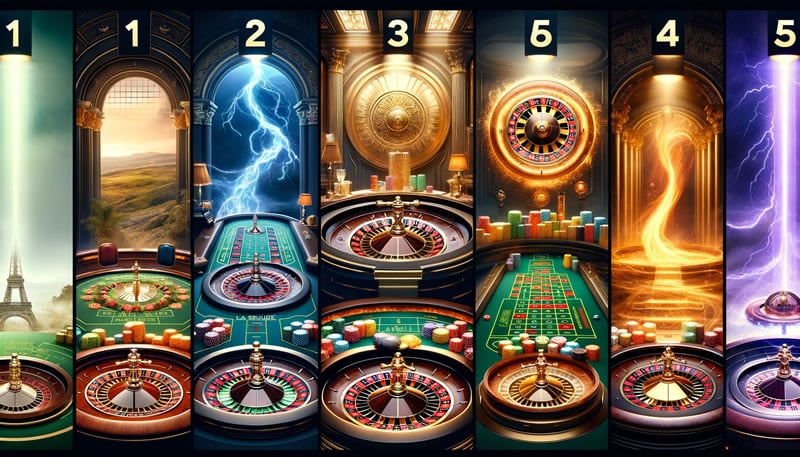The allure of the jackpot is incredibly powerful that individuals across different backgrounds find themselves captivated by it. It presents a nearly irresistible pull comes from the chance of winning a sizable quantity of money through gaming at casinos, participating in lotteries, or other games of chance. For countless individuals worldwide, the idea of achieving sudden wealth and gaining financial independence in an instant holds great appeal. Several psychological factors play a role in the jackpot's attraction.
Main Points
- The allure of the jackpot: The thrill of winning big entices people due to the potential for life-changing rewards.Dopamine and the jackpot effect: The brain's response to potential gains, such as winning a jackpot, is driven by the release of dopamine, creating a feeling of pleasure and drive.Risk and reward dynamics: Our draw to jackpots is fueled by the combination of risk and potential reward, activating the brain's reward system.Optimism and hope in jackpot pursuits: The chance of a big win impacts our mindset, fostering feelings of hope and optimism for the future.Social and cultural influences: The jackpot’s appeal to us is shaped by social norms, cultural expectations, and peer pressure.
The ability to enjoy luxury without worrying about money and the possibility of becoming financially free are the main draws for many. The attraction of potentially being able to afford anything, such as luxurious clothing or exotic trips, motivates people to strive for big successes. Also, a major part of the jackpot's appeal comes from its element of surprise & unpredictability. One cannot easily duplicate the adrenaline rush that is produced by the prospect of striking it lucky with a single lottery ticket purchase or by a large slot machine payout. The allure of the jackpot also taps into people's primal need for adventure and thrill-seeking.
The chance of getting rich offers the promise of a thrilling new life beyond the monotony of daily life. Lots of individuals are driven to chase after huge jackpots because they find great resonance in the idea of taking a chance & possibly emerging victorious. The thrill of placing a huge bet or the suspense of waiting for the lottery results are just two examples of how people are drawn to jackpots because they represent human nature's need for thrills and adventures. Dopamine's Role in Anticipating Wins. Dopamine is critical in attracting us to potential rewards, which is why jackpots are irresistible.
A neurotransmitter called dopamine is produced in reaction to pleasurable experiences like eating delicious food, taking part in enjoyable activities, and yes, winning big. Dopamine plays a crucial role in the brain's reward circuits. Our brains release dopamine in anticipation of a possible reward, such as a lottery win, which feels great and pushes us to seek more rewards. The Dopamine-Propelled Chase of Massive Victories. We are strongly motivated to look for chances for large wins by the strong attraction that is fueled by dopamine production in response to possible rewards.
The possibility of winning a massive prize causes the brain to release a large amount of dopamine, which produces an irresistible rush and joy. It is this dopamine-driven reaction to possible rewards that fuels our craving to take chances in the hopes of landing a big win & pulls us towards jackpots. The dark side of dopamine: the dark side of dopamine. The brain floods dopamine when we anticipate a big win, which can cause addiction-like excitement of excitement and anticipation. Some people develop an addiction to gambling, which can be explained by dopamine's role in our draw to jackpots. A powerful psychological force that can result in addiction & an inability to resist the allure of big wins is created when dopamine is released in response to potential rewards.
Our natural desire for risk and reward is closely tied to the the lottery's attraction. The possibility of striking it rich is a high-stakes game that appeals to our innate yearning for thrills and experiences. Our interest in jackpots is fueled by the risk and excitement that comes with going after big victories. Lots of people find great resonance in the concept of risk-taking and possibly hitting it big, which pushes them to gamble in the hopes of winning the ultimate lottery prize. Our evolutionary past as early humans may also be used to explain the connection between risk-taking and reward-seeking in attracting us to jackpots.
Risk-taking was essential for survival throughout our evolutionary past because it frequently meant the difference between obtaining essential resources and going without. This behavior became beneficial in obtaining food, shelter, and other necessities, it is ingrained in our brains to look for opportunities with high rewards. This natural inclination for risk continues to influence us today, leading us to chase jackpots and urging us to take more risks in the hopes of hitting big.
Our attraction to jackpots is driven by risk & reward, which connects with our need for independence and autonomy. The chance to become wealthy offers the chance to live life without limits and on one's own terms. The opportunity to take a risk and possibly making huge gains appeals to our innate need for independence and self-determination, which motivates us to go for big wins in the quest for financial independence. Our attraction to jackpots is largely driven by the psychology of optimism & hope. The chance for a massive win sparks hope for a better future, which bolsters our confidence and inspires us to aim for large wins.
It is hard to ignore the optimism that arises from the idea that one lucky moment has the potential to improve our lives. The potential for great wealth taps into our desire for optimism and hope, pushing us to take risks in the quest for future prosperity and financial stability. The psychology of optimism and hope also has a significant impact on how we think about going after big victories.
We are energized by hope and we are motivated to pursue big wins despite the odds because we believe in the possibility of winning big. This sense of hope and excitement can create addiction-like behaviors. We gamble for financial freedom because we have an unyielding optimism that one lucky win could change our future. The role optimism plays in our mindset regarding jackpots also relates to our deep desire for control of our life choices. Our optimism is fueled by the possibility of winning big, which inspires us to take risks in the pursuit of financial independence and freedom from financial constraints. It is impossible to overestimate the power of social and cultural pressures on our attraction to jackpots.
We are bombarded with messages that strengthen the allure of striking it rich, with media portrayals of sudden wealth to societal norms to attain financial success. Our attitudes toward chasing large wins are shaped by the ubiquitous influence of social and cultural factors, which fuel our jackpot addiction and spur us to take chances in the pursuit of money. Social pressure and cultural expectations are just two more examples of how cultural pressures shape our attraction to jackpots. Seeking large victories is regarded as an desirable, glamorous, and exciting pursuit in many social circles.

Chasing losses can result in a detrimental cycle that could seriously impact an individual's financial stability and general well-being. The Dark Side of the Jackpot: Mental Health and Relationships. Chasing huge wins can take a toll on personal relationships and emotional well-being in addition to financial losses. Gambling addicts frequently struggle with mounting debt & money problems, which can create anxiety, depression, and feelings of despair.
In addition, gambling for jackpots can damage personal relationships, leading to isolation & isolated. The necessity of Support & Awareness. The dangers of going after large winnings make it clear that individuals struggling with addiction need more understanding and assistance.
It is imperative that society recognize the risks of gambling and offers assistance to those in danger of addiction. By taking these steps, we can endeavor to establish a setting that is safer and more encouraging for those struggling to resist the temptation of jackpots. Develop strategies for responsible gambling behavior to allow people to control the psychological effects of more info jackpot pursuits.
Limiting the time spent and money spent on gambling can help people stay away from compulsive behavior patterns and reduce the risks in gambling for big wins. For individuals struggling with gambling addictions linked to chasing jackpots, getting help from friends, family, or professional counselors can be hugely beneficial. Individuals can protect themselves from developing compulsive gambling behavior patterns by learning effective coping mechanisms for managing stress and anxiety.
People can discover healthy ways to cope with stress without gambling by exercising regularly, meditating, or pursuing relaxing hobbies. In conclusion, people from all walks of life are fascinated by the jackpot because of its irresistible attraction. The appeal of large wins is driven by a variety of psychological factors, ranging from the dopamine response in reaction to possible rewards to our natural craving for risk. However, in order to prevent developing compulsive gambling behavior patterns, individuals need to recognize the dangers involved in jackpot pursuits and adopt healthy habits for managing the emotional effects.
People can experience the excitement of chasing large wins without succumbing to addiction by understanding the mental triggers behind jackpot attraction & cultivating responsible, responsible gambling behaviors.
Frequently Asked Questions
Why are we drawn to huge jackpots?
Our interest in large jackpots stems from the brain's reward system. When we anticipate the possibility of winning a large sum of money, our brains produce dopamine, a neurotransmitter linked to joy and reward-seeking. This dopamine release makes us feel good and creates hope, making it addictive.
What keeps people playing after they lose?
Gamblers keep playing despite losses due to the phenomenon known as "near-miss" experiences. When players almost win, it creates a dopamine boost just like that of an actual win. This near-miss experience can create a sense of hope and drives them to keep playing, despite previous losses.

How does social pressure fuel jackpot attraction?
Social influence plays a significant role in the attraction to winning big jackpots. The visibility of jackpot winners in the media and within social circles can create a sense of social proof, leading individuals to believe that winning is achievable and worth pursuing. On top of that, the excitement and celebration surrounding jackpot wins can influence others to participate in similar activities.
What are the downsides of craving jackpots?
Craving big wins can lead to potential negative effects, particularly when gambling becomes addictive. Excessive gambling in pursuit of jackpots can result in financial strain, relationship problems, and trigger emotional distress. Additionally, the craving for jackpots can create false hope and skew one's view of odds.
What are healthy ways to handle jackpot attraction?
You can keep jackpot cravings under control in a healthy way by limiting time and money spent on gambling, gambling responsibly, and asking for help if they feel their attraction to jackpots is becoming problematic. It's important to keep gambling in perspective and enjoy it for fun over obsessing about winning big.